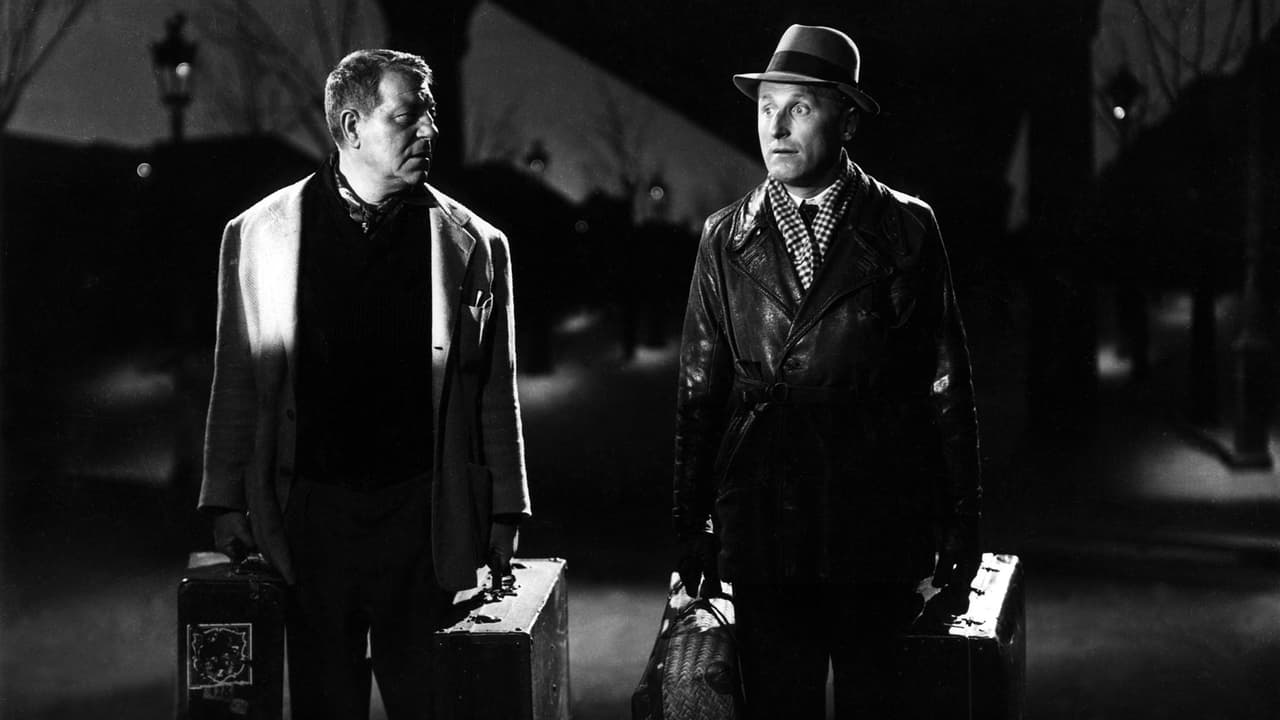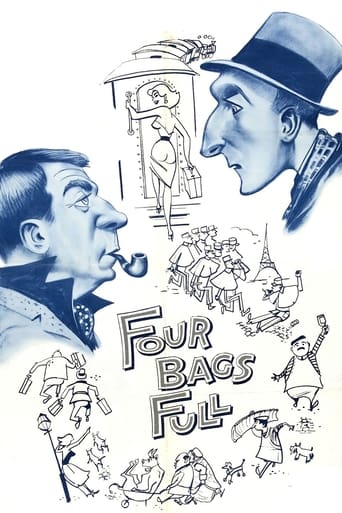



Sadly Over-hyped
A Disappointing Continuation
A movie that not only functions as a solid scarefest but a razor-sharp satire.
View MoreI didn’t really have many expectations going into the movie (good or bad), but I actually really enjoyed it. I really liked the characters and the banter between them.
View MoreUser reviewer jameswtravers ("Bourvil and Gabin at their funniest", jameswtravers from London, England, 18 June 2000) offers background about the negative critical reaction. Bob Taylor ("Hugely entertaining", Bob Taylor from Canada, 13 June 2005) informs us the plot does not resemble the original story.Set in Occupied France during the second World War, Bourvil (Martin) recruits fellow black-marketeer Gabin (Grandgil) to transport a recently butchered pig to a predetermined destination in Paris by carrying two pairs of large suitcases. Much of the killing of the pig is seen on camera. Although the scene is filmed brilliantly, I always downgrade movies that have to resort to showing live animals being slaughtered.When we think of Gabin's monumental filmography, and know in this film we have French Resistance, Black Marketeers, French police and German soldiers/Gestapo men we naturally expect a very gritty journey. (Gabin reminds many people of Spencer Tracy. However, unlike Tracy, Gabin was always very convincing in dangerous, underworld roles. )However, "La traversee de Paris" is not entirely suspenseful. It also has comedic elements and it is allegorical. Gabin's Grandgil is rousing and larger than life, while Brouvil's Martin is duller and timid. Yet, Grandgil is an anti-hero. He unnecessarily creates tensions, particularly with lower class strangers. As compared with Martin's propensity to restore peace (with his wife), and especially with the very likable German interrogator, Grandgil is, well, the only pig in the vicinity.We also find out that this pig Grandgil also has a get-out-of-jail-for-free card. If we begin to associate Grandvil with the French who cooperated with the occupation, his overly rambunctious and demonstrative character seems less mystifying. "La traversee de Paris" upends the universe of post-war French film-goers used to watching films where cooperators are pariahs. This is likely why many film critics were opposed to it on release.The direction and the pacing hold up today. Gabin turns in another great performance of his top-shelf career. It is "off message," but another worthwhile nugget in Gabin's exceptional career.
View More"La traversee de Paris" is a brilliant and often profound blend of comedy and drama. The story is rather uncommon and told in a most anti-rhetoric way. During World War II, in Paris occupied by the Nazis, two men have to deliver four cases filled with pork meat, for the black market. They cross the city overnight, trying to avoid French cops and German soldiers, as well.The fun is mainly based on the duets between the two "heroes", Grandgil (Jean Gabin), and Martin (Bourvil), supported by a first-rate witty script. These two characters are drawn with psychological depth. Grandgil is somehow a mysterious man. Sometimes he seems to be a sort of thug. He despises and bullies innocent by-standers. He wants to cheat and steal the pork meat, following a sort of selfish anarchism. But many clues make the viewer feel that all this should be a Grandgil's joke. On the contrary, Martin is proud to be a decent person, and to keep honest and correct even working for the black market. The unavoidable quarrels arising between the two men build a non-standard but deep friendship. Extraordinary is the actors' job. Jean Gabin is deservedly a cinema legend, and never disappoints the audience. Here the always excellent Bourvil is on a par with his great partner.On the background we have the masterly rendered atmosphere of those bleak years. French people is oppressed by deprivations and lack of food. Patriotism and heroic resistance are far from being appreciated. People are widely depressed by French defeat on the battle-field, and just wait for the end of the war and of German invasion. The first scene sets the tone of the movie. A blind beggar plays the Marseillese with his fiddle. Martin is displeased. What's the point of vainly provoking the Nazis? However he gives a coin to the beggar. And even a German officer gives money to the blind man. As a matter of fact, German soldiers do not appear as cruel barbarians. The officer who questions Grandgil and Martin is even nice. But when something wrong happens (namely, an attack against a German colonel), then the inhuman ferocity of Nazism shows his face. And the French hostages blame the partisans for that! Meanwhile, the swashbuckler Grandgil, always ready to despise other people's cowardice, realizes that in tragic circumstances one must care only for himself and his own life. There is a lot of depth in these scenes, believe me.It is not surprising that this excellent movie was reviled by French audiences and critics when released. This anti-heroic, even petty representation of French people at war-time, was surely hard to swallow. A magnificent nocturnal photography and artistic camera work, together with a first-rate direction by Autant-Lara, add further value to this superb movie.The final scene may appear somehow stuck to the movie. But it contains an important message. Life has won, life continues. Common, simple, decent people survived. Barbarians have lost, doomed to destruction by their own infernal wickedness."La traversee de Paris" is a gem of French cinema. Highly recommended.
View MoreThe bringing together of two great comic actors of the calibre of Jean Gabin and Bourvil could not fail to be a great success, but this film surpasses the audience's expectations by several hundred kilometres. For both actors, this is a real tour de force. Bourvil is the hapless stooge to Gabin's outrageously forceful character, and the double act is unbelievably funny. One can't help but have pity for the poor unemployed Parisian as his night-time trudge across Paris is turned into his worst nightmare.Whilst much of the humour is in the performance of its two stars (joined by Louis de Funes in that amazing cellar scene near the start of the film), the script is well-written and genuinely funny in places. The menace of the Nazi threat is there all the same, and this is heightened by the darkened sets representing a deserted Paris, resounding with the distant tread of the German patrols. The last twenty minutes of the film is a distinct contrast to what preceded it, and the humour appears to fade very quickly into drama. Luckily, our heroes emerge unscathed (possibly), but the threat of what might have been substantially changes one's view of the film.Needless to say, when this film was released in 1956, scarcely 10 years after the end of the Second World War, it was widely reviled. It presented a view of the occupation that, whilst honest and accurate in retrospect, had never before been seen in French cinema and which was simply too much for many to stomach. Gabin's character was a particular target for scorn, representing a cynical free-thinking attitude that could only be regarded as dangerous and anti-Republican. The film's director, Claude Autant-Lara, should be credited with immense courage in presenting to the French people his perception of the war, unadulterated by the constraints of convention. That he should achieve this through one of the funniest of French films is a remarkable achievement.
View MoreMarcel Aymé was an excellent writer who left us, among other things, short stories set in occupied Paris. No patriotic pathos or teary laments, but a dark humorous look at everyday life. With this movie Bourvil revived his carreer and established himself as a real great comedian. Jean Gabin, as usual, is excellent. The story line is simple : two men have to carry across Paris black market pig meat. Bourvil, an unemployed cab driver does it for money, Gabin, a well known artist does it for kicks.
View More